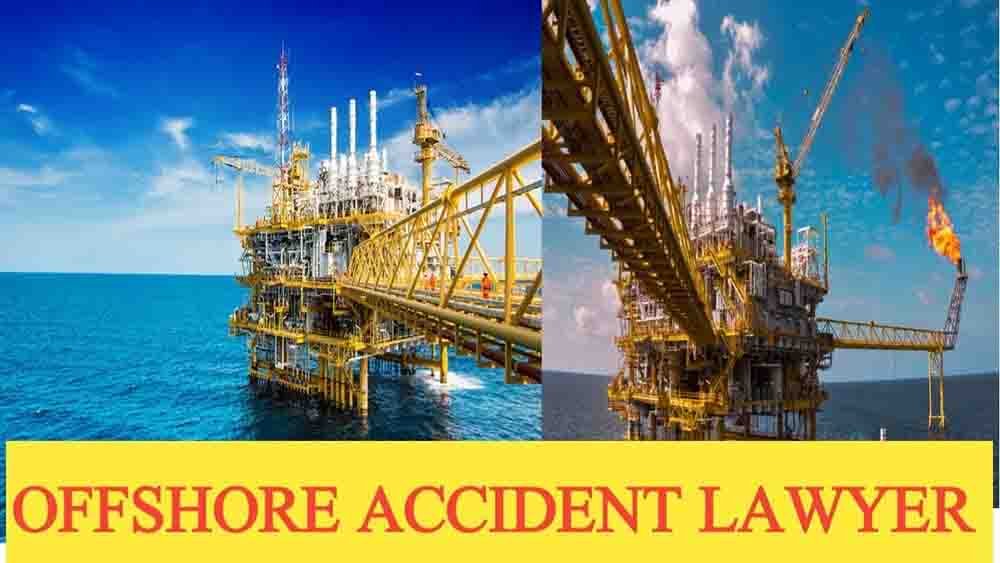Offshore Accident Lawyer: Accidents on the high seas can be catastrophic, affecting not just the individuals involved but also their families. The nature of offshore work—whether it’s on oil rigs, commercial ships, or fishing boats—poses unique risks that require specialized legal knowledge when things go wrong. This is where an offshore accident lawyer steps in, offering the expertise needed to navigate the turbulent waters of maritime law.

Offshore Accident Lawyer
Definition and Types of Offshore Accidents
Offshore accidents occur on navigable waters and involve a range of incidents, from equipment failures and falls to fires and collisions. These accidents can happen on oil platforms, ships, or even while performing underwater tasks.
Common Causes of Offshore Accidents
Many factors contribute to offshore accidents, including equipment malfunction, human error, harsh weather conditions, and lack of proper safety measures. Understanding these causes is crucial for prevention and legal accountability.
Impact of Offshore Accidents
Physical Injuries
Injuries from offshore accidents can be severe, including burns, broken bones, spinal injuries, and even fatalities. The physical toll can be life-changing, requiring extensive medical treatment and rehabilitation.
Emotional and Psychological Effects
The trauma from an offshore accident extends beyond physical injuries. Victims often experience anxiety, depression, and PTSD, which can impact their ability to return to work and lead a normal life.
Financial Consequences
Medical bills, lost wages, and the inability to work can lead to significant financial strain. The long-term economic impact makes it essential to seek adequate compensation to cover these costs.
Legal Rights of Offshore Workers
Maritime Laws Protecting Offshore Workers
Several laws protect offshore workers, ensuring they receive compensation and proper treatment after an accident. Key among these are the Jones Act and the Longshore and Harbor Workers’ Compensation Act (LHWCA).
Jones Act and Its Importance
The Jones Act allows seamen to sue their employers for negligence leading to injury. This law is vital as it provides a clear path for injured workers to seek justice and compensation.
Longshore and Harbor Workers’ Compensation Act (LHWCA)
The LHWCA offers protection to dockworkers and other maritime employees who are not covered by the Jones Act. It provides for medical care and compensation for lost wages due to work-related injuries.
Why You Need an Offshore Accident Lawyer
Expertise in Maritime Law
Maritime law is complex, and an offshore accident lawyer specializes in these intricacies. They understand the legal framework and can effectively advocate for your rights.
Navigating Complex Legal Processes
Filing a claim involves numerous legal steps, from gathering evidence to negotiating with insurance companies. A skilled lawyer guides you through each stage, ensuring no detail is overlooked.
Maximizing Compensation
An experienced lawyer fights to ensure you receive the maximum compensation possible, covering medical expenses, lost wages, and other damages.
Qualities of a Good Offshore Accident Lawyer
Experience and Expertise
Look for a lawyer with extensive experience in maritime law and a deep understanding of offshore accidents. Their expertise can make a significant difference in the outcome of your case.
Proven Track Record
A lawyer with a history of successful cases demonstrates their ability to handle complex claims and achieve favorable outcomes for their clients.
Compassion and Understanding
Dealing with the aftermath of an accident is stressful. A compassionate lawyer provides not just legal support but also emotional support, understanding your situation and helping you through the process.
Steps to Take After an Offshore Accident
Immediate Actions to Ensure Safety and Health
Your priority should be safety. Seek medical attention immediately, even if injuries seem minor. Prompt treatment can prevent complications and provides a record of your injuries.
Reporting the Accident
Report the accident to your employer as soon as possible. This is crucial for documenting the incident and initiating the legal process.
Collecting Evidence
Gathering evidence is vital. Take photos of the accident scene, collect witness statements, and keep all medical records. This information will support your claim.
How to Choose the Right Offshore Accident Lawyer
Research and Recommendations
Start by researching lawyers specializing in maritime law. Seek recommendations from colleagues or look for online reviews to find reputable candidates.
Initial Consultation
Many lawyers offer a free initial consultation. Use this opportunity to discuss your case and assess whether the lawyer is a good fit for your needs.
Questions to Ask Potential Lawyers
Prepare questions to evaluate the lawyer’s experience, approach, and fees. Ask about their success rate, the estimated timeline for your case, and how they handle communication.
What to Expect During the Legal Process
Initial Case Evaluation
Your lawyer will begin with a thorough evaluation of your case, examining the evidence and determining the best course of action.
Filing a Claim
Next, your lawyer will file a claim on your behalf, outlining the details of the accident and the compensation you seek.
Negotiation and Settlement
Most cases are settled out of court. Your lawyer will negotiate with the responsible parties to reach a fair settlement.
Going to Trial
If a settlement cannot be reached, your case may go to trial. Your lawyer will represent you, presenting evidence and arguing your case before a judge or jury.
Common Challenges in Offshore Accident Cases
Employer Retaliation
Some employers may retaliate against workers who file claims. A good lawyer can protect you from such actions and ensure your rights are upheld.
Proving Negligence
Proving that your employer’s negligence caused the accident is often challenging. Detailed evidence and expert testimony can strengthen your case.
Dealing with Insurance Companies
Insurance companies may attempt to minimize payouts. An experienced lawyer knows how to handle these tactics and negotiate effectively.
Case Studies
Successful Offshore Accident Claims
Examining past successful claims can provide insights into what to expect. These cases highlight the importance of thorough preparation and expert legal representation.
Lessons Learned from Past Cases
Learning from previous cases helps in understanding common pitfalls and strategies for success. It underscores the importance of experienced legal counsel.
Tips for Offshore Workers to Prevent Accidents
Safety Training and Awareness
Regular safety training ensures workers are aware of the latest protocols and can respond effectively in emergencies.
Use of Protective Gear
Always use appropriate protective gear. It may seem cumbersome, but it can save lives and prevent injuries.
Adherence to Safety Protocols
Following established safety protocols is crucial. These rules are in place to protect you and should never be ignored.
FAQs about Offshore Accident Lawyers
When to Contact a Lawyer
Contact a lawyer as soon as possible after an accident. Early legal intervention can significantly impact the outcome of your case.
Cost of Hiring an Offshore Accident Lawyer
Most offshore accident lawyers work on a contingency fee basis, meaning they only get paid if you win your case. This arrangement makes legal representation accessible to all.
Duration of Offshore Accident Cases
The duration of a case varies based on its complexity. Some cases settle quickly, while others may take months or even years to resolve.
Conclusion
Navigating the aftermath of an offshore accident is challenging, but you don’t have to do it alone. An offshore accident lawyer provides the expertise and support you need to secure the compensation and justice you deserve. By understanding your rights and the legal
You May Also Like😘👌





